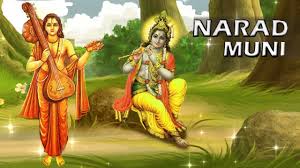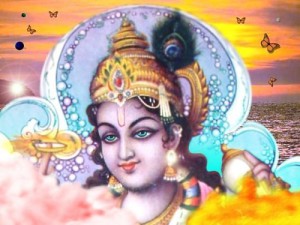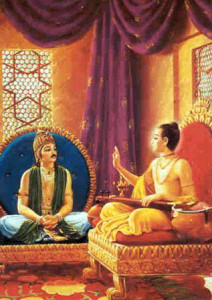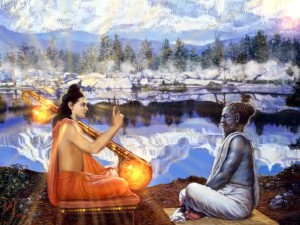The Story of Narada Muni and Krishna
Once, Narada Muni, the great sage and devotee of Lord Krishna, was sitting with Krishna, observing as people approached the Lord with their various requests. One by one, individuals came to Krishna, each asking for different material benefits.
One person asked to be sent to some far away country, and Krishna granted the wish. Another requested a new house, and Krishna fulfilled that desire as well. Someone else came with concerns about their failing business, and Krishna provided the solution. Each time, Krishna granted their material desires without hesitation.
However, when a devotee approached and asked for Bhakti, Krishna’s response was different. Instead of granting the wish immediately, Krishna told the devotee to stand aside. Narada Muni, observing this, was perplexed. He asked Krishna, “Why are you giving everyone what they ask for, yet making those who desire Bhakti wait?”
Krishna smiled and explained, “Narada, I give material blessings freely because they do not bind me. But Bhakti is different. When I grant Bhakti, I become a slave to that devotee. I must ensure that the person who receives this gift is truly deserving, for once I give it, I am bound to them forever.”
Krishna’s words reveal the profound truth that Bhakti is not easily attained. It is a rare and precious gift, one that requires both sincere effort and divine grace. Even the most dedicated practitioners must strive earnestly, sometimes for many years, before they may be blessed with true Bhakti.
The Difficulties of Material Existence
The path of Bhakti is not free from the challenges of material life. Every soul inhabiting a material body must face the inevitable pains of birth, aging, sickness, and death. In addition to these four unavoidable sufferings, there are three other forms of misery: those caused by the body and mind (Adhyatmik), those caused by other living beings (Adhibhautik), and those caused by natural disasters (Adhidaivik). These seven types of suffering are constant companions in the material world, and no one can escape them.
Even the most devoted followers, like the residents of Vrindavan, faced great trials. For instance, when Indra, the king of the heavens, was angered because his sacrifice was stopped, he sent torrential rains to devastate Vrindavan. The people were in great distress, but Krishna came to their aid, lifting the Govardhana Hill on the little finger of his left hand to shelter them from the storm. Krishna’s protection in times of trouble exemplifies how he cares for his devotees, even amidst the harshest challenges of material life.
Conclusion: The Rarity and Value of Bhakti
The story of Narada Muni and Krishna teaches us that Bhakti is not something that can be casually obtained or demanded. It is the highest form of grace that binds the Lord to the devotee in a relationship of eternal love and service. Bhakti is rare, and it requires a heart completely surrendered to the divine, free from the distractions and desires of the material world.
A Prayer for Bhakti
O Lord Krishna,
Grant us the strength and patience to seek true Bhakti.
May we surrender all our senses and our very soul in service to You.
Help us to rise above the material desires that bind us and keep us from Your divine love.
Guide us to follow in the footsteps of the Gopis, whose devotion to You was pure and unshakable.
Let us drink deeply from the nectar of Bhakti,
So that we may become Your Gopijana, bound to You in love and service.
O Krishna, please bless us with Your Bhakti,
So that we may remain eternally at Your feet,
Immersed in the joy of Your divine presence.
Om Shanti, Shanti, Shanti.



